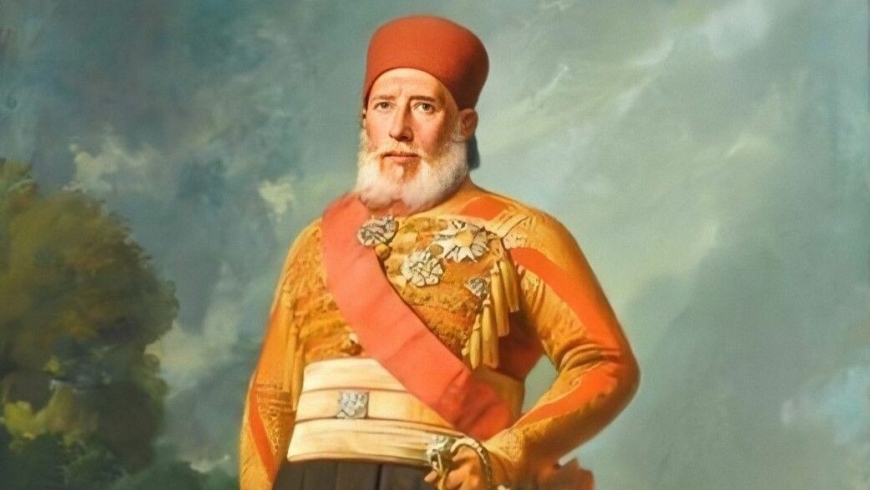Because of the many victories of Ibrahim Pasha in the battles he led during the reign of his father, Muhammad Ali the Great, we can call him the “victorious leader” whose victories, despite their great importance, did not preoccupy him with the love of horses, their care and breeding, and the keenness to acquire thoroughbreds from them.
It is Ibrahim Pasha, who is considered one of the best leaders of the armies in the nineteenth century, and fought in many countries.
The beginning was when his father, Muhammad Ali Pasha, appointed him commander of the Egyptian campaign in the Arabian Peninsula, which took place between 1816 and 1819. He successfully achieved what was asked of him. Ibrahim Pasha received from the Sultan a generous reward, and his father Muhammad Ali Pasha received the title “Khan”, a title that he did not get other than him.

He was the most powerful supporter and helper of his father in all his projects, and he was valiant in war, not afraid of death, and a seasoned leader who did not miss young or old in the arts of war, and he established the Egyptian hospice in 1816 AD.
Ibrahim received the education that was given in his time to princes from the sons of the East. He is conversant in the Turkish, Persian and Arabic languages, speaking, reading and writing in them effortlessly, while briefing him on the history of the nations of the East and making him fully aware of it.
In his father’s footsteps…
Ibrahim Pasha inherited from his father a love for purebred Arabian horses, so he was keen to acquire themselves. The historian Ibrahim John recorded in 1815 that Ibrahim Pasha acquired 200 of the best Bedouin horses, which were said to be unparalleled in the Arabian Peninsula, and some of them later became the property of Abbas Pasha.
Ibrahim Pasha was fond of the Arab race, found Arab thought more flexible than the Turks, enjoyed mingling and conversing with the Arab forces, and always praised the race from which he arose, and when asked, he said that he came to Egypt when he was a child, and that the sun changed his blood, and made him an Arab. He joined the stables of Ibrahim Pasha Al-Nyorky, the dentist of the Arabian horse.
Clout Bey describes Ibrahim Pasha
Clout Bey Ibrahim Pasha described in his book “An Overview of Egypt” by saying: Ibrahim Pasha is a quarter of the stature, his height is five feet and two inches, he is of strong build, well-bred, prematurely grayed by the troubles and hardships of war, after the hair of his head and beard was emerald blond, oblong Face long nose tapered, blue eyes.
His temperament is bloody and bile, and then his inclination to be serious, despite his devotion at times to some kindness and love of laughter, has a loud voice. For this reason, he did not have what his father had of tolerance and fragility, so that if someone approached him, he felt what would fall into his soul. Even if he did not meet him with any timidity, rigidity or dislike.
Commander Ibrahim collects the finest horses
Ibrahim Pasha was appointed in 1848 as the representative of his father, Muhammad Ali Pasha, in the rule of Egypt, and his father was still alive at that time, but his mental powers weakened, except that he died before his father in November of the same year, and he was also a representative of his father and a follower of his policy in love of horses And spending on it very generously.
The English orientalist “Sadler” mentions that he met Ibrahim Pasha at “Abyar Ali” near Medina, heading to Suez, with more than 300 mare of the finest, strongest and best purebred horses.
Ibrahim Pasha used to get horses as gifts from the tribal chiefs to approach him, or to buy them at attractive prices.
Ibrahim Pasha stables
The veterinarian Hamont says that the method used in the stables of Muhammad Ali Pasha was the same as in the stables of his son Ibrahim, and the stable of Commander Ibrahim was on the banks of the Nile very close to Cairo in the current Garden City area, where Commander Ibrahim built the High Palace, and this palace witnessed the first sessions of The Shura Council under his leadership (or the Consultation Council, as it was called in 1829), then Khedive Ismail inherited the palace from his father, and gave it to his mother, and it was known as the “Al-Walda Pasha” palace.
The founding horses of Ibrahim Pasha’s stable are Najd horses
The French doctor Hammond explained that the commander Ibrahim Pasha chose the mares and stallions found in the stables from Najd himself from the Arabian Peninsula when they were under his command.
He added that there are approximately 400 mares in the stable, and there are some Egyptian mares and horses, and the place where Ibrahim Pasha’s stable is located is suitable for horse breeding despite the high humidity, but diseases are much less than Shubra stable, and the level of horses is much higher than Shubra stable
Hammont pointed out that the four legs of the foals are tied with ropes as soon as they reach maturity, and the growth of the foals was weak, and the shackles deformed their legs.
The veterinarian Hammont stated that Ibrahim Pasha, after seeing the remarkable results of his father’s new stable, asked him to go to the stable, and prepare a report on the repairs required, and allowed him to move freely, and also asked him to help Mr. Bolofort, the manager of his own stable.
Hamnet began to establish the new stable of Ibrahim Pasha, as he did to Muhammad Ali Pasha. Hammont accused the Turks that the powdered barley caused scabies and indigestion, and Hammont disagreed with the initial customs of the Turks followed in the stable, which one cannot bear; They assert that the mare should only mate at a certain time on the full moon, or when the body is at a specific altitude.
Ibrahim Pasha was holding an auction to sell expensive 3-year-old foals, and he displayed the best horses.
Ibrahim Pasha, conqueror of Greece and the Ottomans
Greece, and part of Eastern Europe, had been affiliated with the Ottoman Empire since the 15th century AD, and when the revolution against the Ottoman Empire took place, the Sultan was unable to quell it; Therefore, he asked Muhammad Ali Pasha – the most powerful ruler in the framework of the Ottoman Empire – to put an end to that revolution.
So Muhammad Ali sent his eldest son Ibrahim Pasha, who succeeded in eliminating the revolution and ended the rebellion. During that war, the Egyptian army gained field experience, and included Muhammad on the island of Crete (a reward from the Sultan).
The defeat of the Ottomans in the Levant War
The Egyptian-Ottoman War (1831 – 1833), or what is known as the First Levant Wars, is the first part of the military conflict between Egypt and the Ottoman Empire.
During the rule of Muhammad Ali Pasha, he began to demand the Ottoman Sultan to grant him the mandate of the Levant in return for his assistance in the Greek War of Independence. The state of Muhammad Ali to the upper Euphrates River.
Crush the Ottomans at the Battle of Nezib
In 1839, the Ottoman Sultan moved an army; To try to recover the lands of the Levant, which Ibrahim Pasha succeeded in conquering during the first Egyptian-Ottoman war, and the result of that move was that Ibrahim Pasha prepared his army, and crawled again to Anatolia, until the Nezib battle took place, in which Ibrahim Pasha, with his military genius, was able to crush the Ottoman army And here the Ottoman Empire was on the verge of collapse.
Britain, Austria and other European countries rushed to intervene and force Egypt to accept the Treaty of London.
Britain succeeded in igniting the revolutions of the people of the Levant against Egyptian rule, until the Ottoman Empire regained Syria, and Hafez Pasha, accompanied by Moltke, sent the army to Syria..






